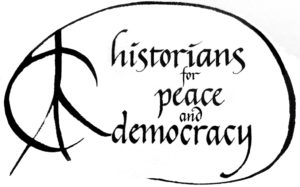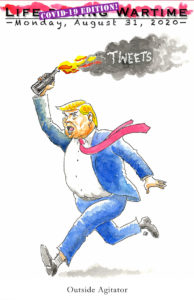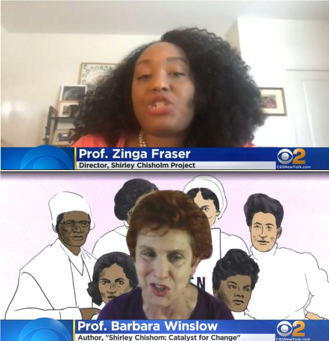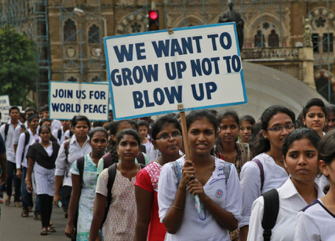
H-PAD Update
Occasional Newsletter #6, Sept 15, 2020
(also available as a pdf for downloading and/or printing)
Special Issue! Mobilize Now to Defeat Trumpism at the Polls and through Collective Action!
Labor Day has come and gone, and the final phase of the incredibly contentious 2020 electoral contest has begun. This situation is both dire and hopeful. It is dire because the Trumpist right is accelerating a campaign of racist law-and-order fear mongering, violent repression and disruption, and multifaceted voter suppression–all backed up with the semi-covert threat of some sort of coup. It is hopeful because a very broad array of progressive forces is coalescing–many at least tactically supporting elements of the Democratic Party, while some are more militant. All aim to deliver a big defeat to Trumpism, and many want to move forward with major political reforms.

This is an emergency situation and progressive groups like H-PAD must deepen our attempts to bolster the anti-Trumpist campaign, especially in light of signs of discouragement and disorientation among some progressive forces (including perhaps in H-PAD). But what can a small, loose organization and, an uneven network of radical historians, educators, intellectuals, and writers with limited resources, do in such an emergency? We, have, of course, initiated a campaign for the Faculty Network for Student Voting Rights that is advancing (more below). Plus many H-PAD supporters are no doubt engaged in their own political work around the emergency. But we really don’t now have the ability to organize additional campaigns. However, we can send a call to H-PAD supporters, encouraging them to find ways to get more involved, offer some general directions and suggestions, point to possible allies, and attempt to help them share their ideas for actions and their experiences.
This newsletter is an attempt at such a process.
We Encourage Emergency Involvement in Three Areas of Activity
- Electoral and Voting Rights Activity
Look into the Faculty Network for Student Voting Rights (FacNet). Initiated by H-PAD, it has grown rapidly into a national network of hundreds of faculty and other activists working to empower students electorally and to overcome voter suppression attempts against them. FacNet needs more faculty (current or retired) participants. To find out more about this organization, check out its website, follow it on Twitter at @facultynetwork, and join its Slack channel. Its most recent FACULTY NETWORK NEWSLETTER, September 8, is particularly useful; it should be posted soon at https://facultyforvotingrights.org/programming/. FacNet works in alliance with established groups such as the SLSV [Students Learn Students Vote] Coalition.
Beyond FacNet, there are many local, regional and national groupings working on voter rights. Some of the best-organized projects are focused laser-like on the November elections – specifically, increasing the voter turnout, especially in “swing states,” among populations that tend to favor progressive candidates and causes, but don’t vote in proportion to their numbers. Here, for example, are some groups:
- The Movement Voter Project (https://movement.vote) raises funds for grassroots organizations that are embedded in under-voting (especially African American) communities in swing states, on the premise that the people who know these communities are best able to motivate them to use their potential electoral power.
- Flip the West (https://www.flipthewest.com) focuses on U.S. Senate elections in six states west of the Mississippi River. Through phone banking and letter writing, activists in (mostly) blue states make contact with potential voters thought likely to support Democratic candidates (if they vote). The Senate races are in Arizona, Colorado, Montana, Alaska, Iowa, and Kansas.
Vote Forward (https://votefwd.org) has a goal of 10 million carefully formulated letters to potential voters in fifteen contested states.
And there are, of course, progressive candidates and issue campaigns, locally and nationally, that need support.
- Political-Educational Work as Historians and Historically-Oriented Intellectuals
One possibility is to focus on providing progressive historical analysis of the current emergency for left/progressive/liberal audience like the those we reach via H-PAD emails and publications. In fact, you might consider joining us in writing for these publications, like our Broadsides (https://new.historiansforpeace.org/). There are of course a large number of other venues to contribute articles or letters to, say, the Nation, Portside, Counterpunch, local political newsletters, and even the History News Network (e.g., see Margaret Power and Alexander Aviña’s recent piece in HNN—https://historynewsnetwork.org/article/174241). These writings would be geared toward exhorting, activating, and empowering this audience to take historically and theoretically grounded action during the current crisis.
Another focus is on a much broader popular audience that includes both and non-voters and Trump supporters. For example, you might write op-eds and letters to the editor (LTEs) for local and regional publications, and perhaps for national ones. Better yet, create small (or perhaps not so small) network of colleagues to produce and submit these writings. Many of you reading this newsletter are probably experienced with LTEs, and you might share your experience with colleagues—we can connect you through H-PAD. Moreover, there are how-to web sites devoted to writing LTEs like the ACLU’s at https://www.aclu.org/other/tips-writing-letter-editor.
 Likewise, another possibility is appearing on news programming on local TV or radio—especially public radio– as a historical expert, or commentator, or part of a panel (university communications offices sometimes help with such placements). For example, recently, historian Zinga Fraser, along with historian and H-PAD SC member Barbara Winslow, helped to shape a CBS New York segment on Shirley Chisholm as historical context for the selection of Senator Kamala Harris as the Democratic vice presidential candidate; both were interviewed during the segment (https://newyork.cbslocal.com/2020/08/12/kamala-harris-shirley-chisholm/ ). Their participation clearly made a political contribution.
Likewise, another possibility is appearing on news programming on local TV or radio—especially public radio– as a historical expert, or commentator, or part of a panel (university communications offices sometimes help with such placements). For example, recently, historian Zinga Fraser, along with historian and H-PAD SC member Barbara Winslow, helped to shape a CBS New York segment on Shirley Chisholm as historical context for the selection of Senator Kamala Harris as the Democratic vice presidential candidate; both were interviewed during the segment (https://newyork.cbslocal.com/2020/08/12/kamala-harris-shirley-chisholm/ ). Their participation clearly made a political contribution.
Likewise, another possibility is appearing on news programming on local TV or radio—especially public radio– as a historical expert, or commentator, or part of a panel (university communications offices sometimes help with such placements). For example, recently, historian Zinga Fraser, along with historian and H-PAD SC member Barbara Winslow, helped to shape a CBS New York segment on Shirley Chisholm as historical context for the selection of Senator Kamala Harris as the Democratic vice presidential candidate; both were interviewed during the segment (https://newyork.cbslocal.com/2020/08/12/kamala-harris-shirley-chisholm/ ). Their participation clearly made a political contribution.
And we recommend that those who can do it, participate in or produce podcasts (historian Steven Leibo suggests this site to get you started). Or short video clips: H-PAD EC member Kevin Young has suggested (while admitting there may not be time enough to do this) that we create a video montage of diverse historians delivering short warnings about the dangers of Trumpism. And folks who know how to do this might engage the crisis by intervening in historical-political debates on social media. There are no doubt H-PADers reading this newsletter than can give us all guidance and share experiences in the political use of podcasts, video, and social media. If you are such a person, and have the time to do this, please contact us immediately.
H-PAD is making an eleventh hour effort to provide online presenters on a variety of important domestic and international issues relating to the current crisis. As SC member, historian Carolyn Rusti Eisenberg, who is leading this effort, writes, “Over the next eight weeks, Historians for Peace and Democracy hopes to assist folks around the country, who are interested in organizing Issue Forums at their schools. Towards that end, we hope to provide a Speakers List of Historians and Activists, who are willing to participate in these virtual events.” Information on these speakers will be distributed very soon, and if you are interested in being a speaker, please contact us immediately (see below).
- Sharing and Networking Our Responses to the Emergency
A key theme in the above discussion of this emergency mobilization against Trumpism has been coordinating, networking, and sharing. We think this is crucial on all levels of activity from local work we do as individuals or in small groups, to activities explicitly related to H-PAD. H-PAD wants information on your activities, experiences, and expertise (especially in using media and social media in organizing). In return H-PAD plans to share your activities, experiences, and expertise with our supporters. The primary vehicle for this sharing will, we hope, be our Facebook site, https://www.facebook.com/historiansforpeace/. Please, as appropriate, share there; also, you can write us at the addresses below.
A Webinar of Interest on September 16
Global Cooperation or New Cold War? The People’s Foreign Policy
With Max Elbaum and Tobita Chow
 This webinar, sponsored by Massachusetts Peace Action, Organizing Upgrade, and Justice is Global, will raise crucial questions about international relations in the longer term, beyond the current emergency period. In fact, it intends to put the current period in a broader perspective.
This webinar, sponsored by Massachusetts Peace Action, Organizing Upgrade, and Justice is Global, will raise crucial questions about international relations in the longer term, beyond the current emergency period. In fact, it intends to put the current period in a broader perspective.
Register: https://masspeaceaction.org/event/global-cooperation-or-new-cold-war-the-peoples-foreign-policy/
Join H-PAD, Engage the Current Crisis!
Join us in our ongoing activities—see our newsletters and website for details. Launch your own project to fight the crisis. Contact us with your questions and with information on your involvements.
Contacts: Andor Skotnes: skotna@sage.edu; Kevin Young: kayoung@umass.edu
H-PAD web site, https://new.historiansforpeace.org/ Facebook, https://www.facebook.com/historiansforpeace
